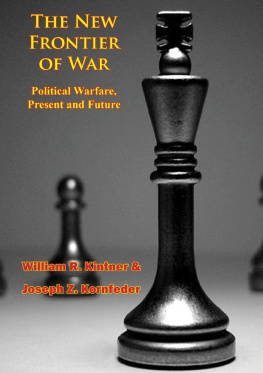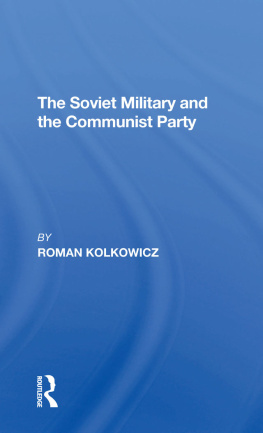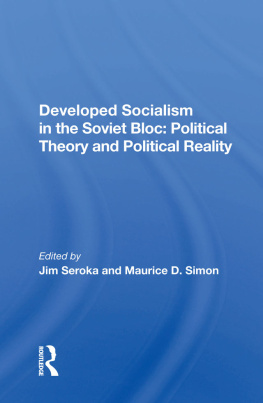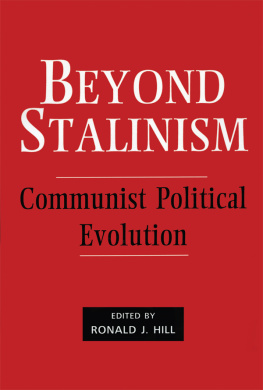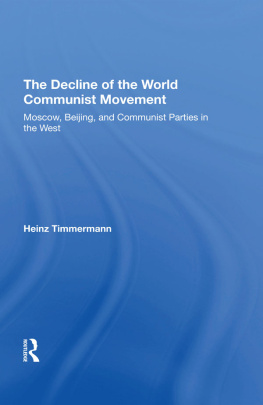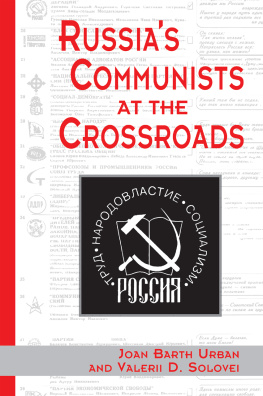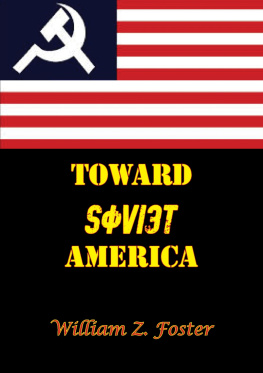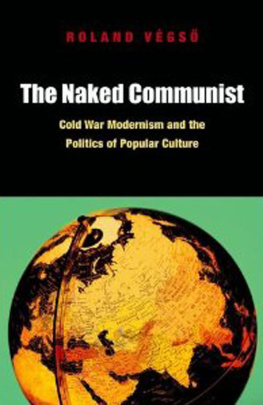Barakaldo Books 2020, all rights reserved. No part of this publication may be reproduced, stored in a retrieval system or transmitted by any means, electrical, mechanical or otherwise without the written permission of the copyright holder.
Publishers Note
Although in most cases we have retained the Authors original spelling and grammar to authentically reproduce the work of the Author and the original intent of such material, some additional notes and clarifications have been added for the modern readers benefit.
We have also made every effort to include all maps and illustrations of the original edition the limitations of formatting do not allow of including larger maps, we will upload as many of these maps as possible.
THE NEW FRONTIER OF WAR
POLITICAL WARFARE, PRESENT AND FUTURE
BY
WILLIAM R. KINTNER
WITH JOSEPH Z. KORNFEDER
PREFACE
WHILE LIVING IN FRANCE IN 1958, I RECEIVED A LETTER FROM Joseph Z. Kornfeder asking me to collaborate with him in writing a book on communist political warfare. The request seemed natural because both he and I had devoted a good part of our lives to the understanding of communist ideology, organization, and strategy. Kornfeder attended the Lenin School in the period 1927 to 1930. Benjamin Gitlow, a leading former member of the Communist Party, U.S.A., stated that Kornfeder knew Stalin better than any other member of the American Communist Party. After receiving his training at the communist political-warfare school, Kornfeder helped to organize the Communist Party in Venezuela and Colombia. He left the movement in the mid-thirties when it became apparent that the Party had abandoned all the ideals which attracted him to it and had been transformed into a power apparatus.
In part this book represents a memoriam to Mr. Kornfeders wife, Eva, and his son, Spartac, who along with untold numbers of other victims perished in Stalins purges during the thirties.
My own interests in the study of communism began after World War II as a result of my service in the Intelligence Division of the Armys General Staff. Subsequently, I have had the opportunity to study and write extensively on many facets of the confrontation between communism and the Free Worlda condition which the Communists now describe as a conflict of systems. Service in the C.I.A., the National Security Council Planning Board, the Executive Office of the President (as an assistant to Nelson A. Rockefeller), and, finally, in the Office of the Chief of Staff of the United States Army gave me a privileged insight into the totality of the communist effort to undermine the Free World, as well as the nature of the American response to this challenge. In particular, I have sensed a decreasing American willingness to wage the struggle in the realms of psychological, ideological, and political warfare. It is in these areas that the Communists have laid the foundation for the successes they have achieved. I became convinced that our failure to understand the inner logic of communism and communist political warfare lies behind many of our difficulties in coping with the communist challenge, I therefore accepted Mr. Kornfeders suggestion to undertake this study.
Because we were moving into as yet uncharted seas, the writing of this book was a time-consuming and demanding task. The book has benefited from the advice, assistance, and critical comment of many knowledgeable people. In its early stages, Richard G. Stilwell and Paul C. Davis helped to establish the books subsequent focus. Keith Wheelocks provocative criticisms of the initial draft were also helpful in developing the final formulation. Subsequently, Walter and Loma Hahn contributed editorially to simplifying its presentation. Later, many individuals contributed to the development of specific chapters. These included Alda Raffa, who made available some penetrating observations regarding The Expanding Conflict of Systems; Tai Sung An, who helped shape Communist China in Political Warfare: Past, Present, and Future; and Genevieve Linebarger, who helped to prepare the first draft of Southeast Asia: Confused Battleground and assisted in its final formulation. Among the many individuals whose knowledge was put to use in The Latin American Way were Nathaniel Weyl, Sig Synnestvedt, William Doherty, Jr., and John Caldwell. Allen Grants thorough investigation of the inadequacies in the training of the American people with regard to the theory and practice of communism is largely reflected in Training for Political Warfare, Conflict Management has benefited from the suggestions of Gregory L. Higgens, Edwin F. Black, John Cushman, and John Stutesman. Betty Macafee helped with the notes concerning Africa in the introduction to Part Two. Vladimir Petrovs unusual background as a former citizen of the Soviet Union and a staff member of the U.S.I.A. made his knowledge of present-day Soviet society very helpful in writing Target: Communist Vulnerabilities.
Stefan T. Possony, a colleague and my associate in many endeavors, strengthened the entire manuscript with his incisive critique and suggestions on many points of fact and interpretation. The study in its book form has also benefited immeasurably from the editorial skill and substantive knowledge of Paul M. A. Linebarger, whose competence did much to clarify the content and make it more readable. Paul Ambrose assisted with the indexing and with the bibliography.
I have benefited throughout the preparation of this book from my association with the Foreign Policy Research Institute. Dr. Robert Strausz-Hup, the Director, and many of the associates and members of the staff have contributed much in thought, time and effort. The book would not be what it is without their unstinting co-operation.
The books argument gained force and thrust through the clarity of view, perseverance, and deep insight of my colleague, Joseph Z. Kornfeder. The final formulation, however, was largely my own. And, as with any book, someone had to make choices when points of difference arose. I assume full responsibility for what actually appears on these pages.
This preface would not be completein fact, the book would never have been writtenwere it not for the secretarial help of Margaret Capotrio, Kay Christiansen, Patricia Hawes, Jacqueline Ketcham, Diane Kressler, Ruth Yeuell, and Joy Cottrell.
WILLIAM R. KINTNER
INTRODUCTION
LENIN ASKED OF HISTORY: WHO IS STRONGER? HIS QUESTION becomes more crucial as time passes. Despite the hopes and wishes of good men everywhere, the confrontation of two antagonistic systems becomes plainer and sharper every day. The Free World, to its sorrow, has learned that men cannot dispose of armed enemies by simply wishing that they were not hostile. Reconciliation, like war or love, is a process which requires two partners; it cannot be effected by one side alone.
The doctrines and stresses of the communist system have made the system and the leaders within it the blind captives of their own belief. Their human intelligence and their moral qualities function, but they function only within the postulates of the dramatic, dangerous theories to which they are now irretrievably committed.
On both sides, the sense of impending climax is sharp. President Kennedy said, after the Cuban fiasco, I am equally convinced that history will record the fact that this bitter struggle reached its climax in the late Nineteen Fifties and the early Nineteen Sixties. {1} Khrushchev, characteristically, was even more blunt: Our epoch is the epoch of the triumph of Marxism-Leninism. In his basic-policy statement of January 6, 1961, he explained this in detail: An analysis of the world situation as it had shaped by the beginning of the sixties of this century is bound to give all champions of the great Communist movement a feeling of deep satisfaction and legitimate pride. Indeed, comrades, reality has far exceeded the boldest and most optimistic predictions and expectations. {2} He added, grimly but realistically, that the triumph of Communism was itself a jolt to the enemies of communism; victory was close enough to become a factor in its own achievement. {3}

